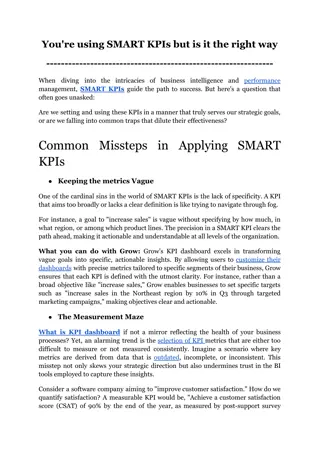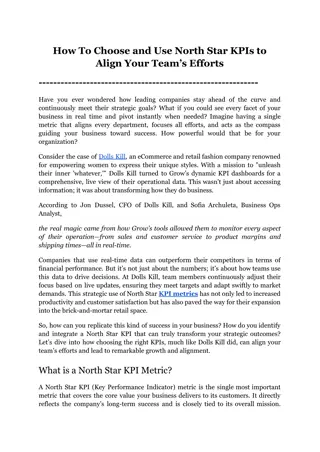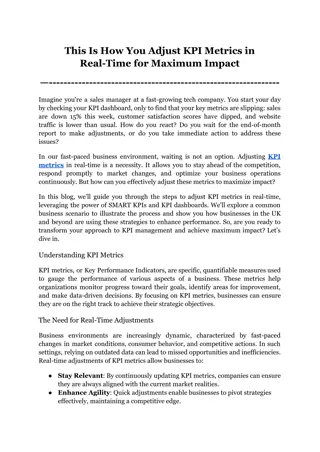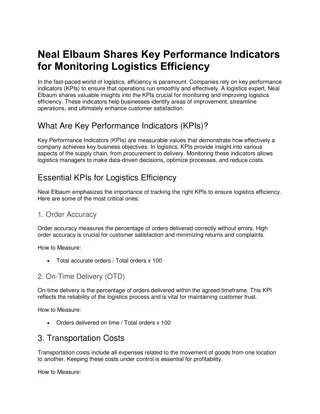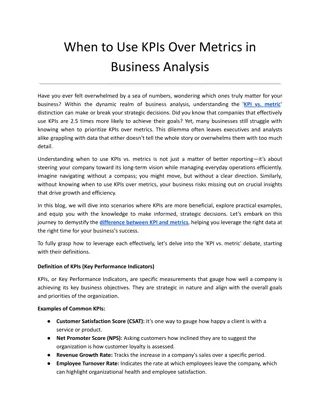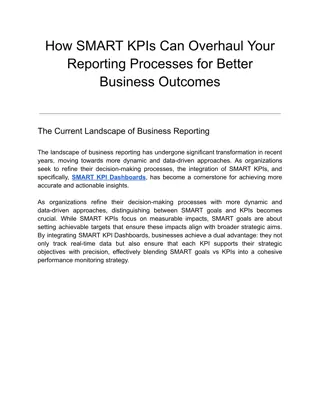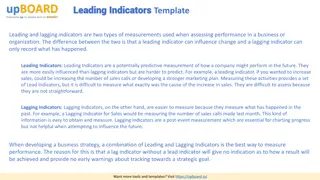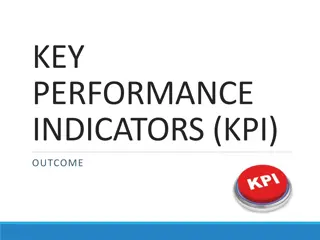Understanding Key Performance Indicators (KPIs) and Implementing Them Effectively
Key Performance Indicators (KPIs) help organizations measure overall performance and success. They provide insights into measurable success factors, aid decision-making, and track progress towards goals. This content discusses creating KPIs, defining business objectives, setting targets, identifying supporting measures, and creating action plans for successful implementation.
Download Presentation

Please find below an Image/Link to download the presentation.
The content on the website is provided AS IS for your information and personal use only. It may not be sold, licensed, or shared on other websites without obtaining consent from the author. Download presentation by click this link. If you encounter any issues during the download, it is possible that the publisher has removed the file from their server.
E N D
Presentation Transcript
Key Performance Indicators (KPIs) Key Performance Indicators (also known as KPIs) help measure the overall performance and success of an organization. Many companies use KPIs across departments to measure the success of specific groups and the organization as a whole. In addition, Key Performance Indicators are a helpful tool in decision-making since they create visibility into the measurable success factors of an organization. KPIs can also be used to understand where a team, department or organization stands with respect to the implementation of its strategies, goals and projects. 1 Want more best practices? Visit Praxie.com
Enter your business objective or strategy and define the KPI that will best measure it. Also identify any specific supporting measures to indicate progress toward the overall KPI. Track your progress over time. Key Performance Indicators (KPIs) Status Enter Business Objective or Strategy Here # On Track KPI Description Accountable Enter headline description of KPI here Name of KPI Owner here KPI Measures Quarterly Targets (measured across four quarters to reach annual target goal) Q1 Q2 Q3 Q4 Enter Stretch Goal KPI Measure Stretch Goal (quantifiable best case): Enter Target Goal KPI Measure Target Goal (quantifiable realistic case): No. Supporting Key Performance Indicators Owner Supporting Measures #1 Name of owner Quantifiable metric KPI statement here (action focused with quantifiable results that support highest level KPI) On track #2 Name of owner Quantifiable metric KPI statement here (action focused with quantifiable results that support highest level KPI) At Risk #3 Name of owner Quantifiable metric KPI statement here (action focused with quantifiable results that support highest level KPI) Behind #4 Name of owner Quantifiable metric KPI statement here (action focused with quantifiable results that support highest level KPI) #5 Name of owner Quantifiable metric KPI statement here (action focused with quantifiable results that support highest level KPI) 2 Want more best practices? Visit Praxie.com
Actions Create an action plan to implement your Key Performance Indicators. Actions Owner Due Date Enter action here Enter owner Enter due date 3 Want more best practices? Visit Praxie.com
www.praxie.com Learn, Configure & Run Business Best Practice Applications in Minutes. Want more best practices? Visit Praxie.com



